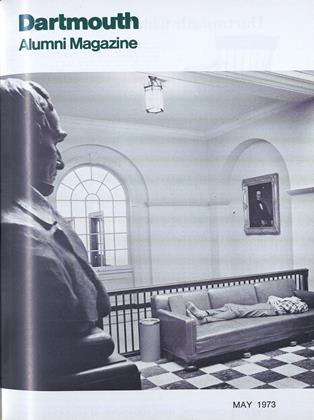By Robert Pack '51.New Brunswick: Rutgers University Press,1972. 68 pp. $5.
As my neighbor's mower weaves a gas-powered curse over the neighborhood, it is good indeed to read of Noon sunlight on the snow, the still field nothing but light ... and know that New England is still there. Robert Pack's latest poems celebrate coming back to earth, home to Vermont, wife and child, lake and trees: utterly simple, like songs of innocence, to remake the world.
In "Everything is Possible," he pretends to create the world already before him, making meadow, fox, lake, fish, and child, and asks her
May I plant him inside you And let him grow To tend the fox and tend the fish, Humming the meadow, Whistling the shape of the lake?
Could we rest then?
But we did not rest: we kept creating until we destroyed. Our paradise cannot be regained until we are born again.
The refrain of Nothing but Light is to find something to hold to, to hold on: we have everything to lose. It is good indeed to read poems that do not say I have suffered, loved, and heartbled for my brothers - the make-believe of well fed poets who have nothing to say.
Unlike many of his contemporaries, Robert Pack plays no mystification games. Like his friends, Wallace Stevens and Robert Frost, he makes quiet statements and shapes them with feeling into poems:
Softly I approach the safe where my reason, with its sentences, its laws, is filed:
three to the left, once around, three to the right, and softly click.
The only suffering is his recognition, in "the Children are Burning," that he and we are powerless to do anything about the world, or to return to that carefree time that never was. Wrath is no use. What can blame cure? he says.
The way out? As Leo Tolstoi said in The Kingdom of God is Within You, "The contradiction between our life and our consciousness may be solved in two ways — by changing our life or by changing our consciousness." So we follow the poet:
I am rising out of myself, leaving my past below — a sleeping body.
After a year in Monteverde, a Quaker farmingcommunity in Costa Rica, Mr. Bowman hopes toreturn to teaching.
 View Full Issue
View Full Issue
More From This Issue
-
 Feature
FeatureWhat's So New About It?
May 1973 By Joanna Sternick, A.M. '72 -
 Feature
FeatureLAND OF LOVE
May 1973 By Ralph J. Fletcher '75 -
 Feature
FeatureSCOPE: Off-Campus Options Made Easier
May 1973 By MARY ROSS -
 Article
ArticleThe Indian Yell Revisited
May 1973 By Russell O. Ayers '29 -
 Article
ArticleFaculty
May 1973 By ROBERT B. GRAHAM '40 -
 Article
ArticleHis Own Man
May 1973 By DERO A. SAUNDERS '35
DAVID BOWMAN '63
Books
-
 Books
BooksFACULTY PUBLICATIONS
January, 1926 -
 Books
BooksTHE CONNECTICUT RIVER AND OTHER POEMS
February 1940 -
 Books
BooksSustainable Resources
JUNE 1982 By Denis L. Meadonws -
 Books
BooksThe Peacemakers of 1864
JANUARY, 1928 By H. Donald Jordan -
 Books
BooksVoice for the Voiceless
SEPTEMBER 1982 By Harry T. Schultz '37 -
 Books
BooksPIERRE-SIMON BALLANCHE:
August 1946 By MARIE-LOUISE MICHAUD HALL




